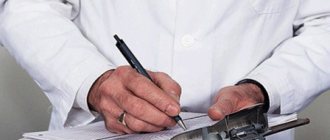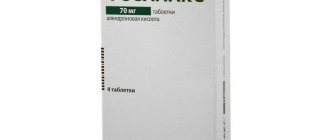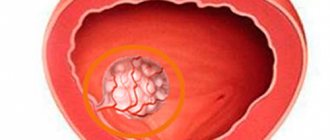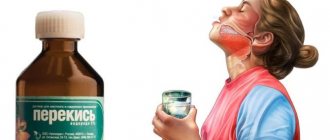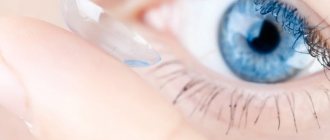Ejaculation is a complex physiological process that combines two processes - emission and ejaculation itself. The emission phase is the result of a reflex response from the nervous system (and reflexes, if you remember, depend on our will to a very limited extent).
This occurs after erotic stimulation (visual or during direct contact). In the emission phase, sperm is released into the lumen of the urethra due to contraction of the vas deferens, seminal vesicles and prostate. As the sensation of impending ejaculation increases, the ability to control volition progressively decreases, reaching a certain point when ejaculation cannot be stopped.
Directly following the emission is the expulsion phase - also the result of the unconditional, i.e. that is not subject to volitional control . During this phase, the internal sphincter of the bladder closes to prevent backflow of semen. After this, the external sphincter opens and the sperm is released due to the contraction of the pelvic floor muscles.
If you dig even deeper, then at the biochemical level, ejaculation is an even more complex process. I do not encourage you to remember these complex names, I will indicate them only so that you can imagine how difficult it is for even a very competent doctor to understand why this or that man has this problem.
So, the participants in the process: norepinephrine, serotonin, gamma-amino-butyric acid, nitric oxide. Increased levels of estrogen hormones (they are also called “female” hormones, although men should also have a certain amount of estrogen) or decreased levels of testosterone, the main male hormone, can cause ejaculation disorders. If a man has problems with his thyroid gland, this usually leads to problems in the sexual sphere. If thyroid hormone levels are elevated, premature ejaculation (PE) may occur. If it is reduced, then, as a rule, the erection process is disrupted.
Now judge for yourself - is it easy or difficult to treat premature ejaculation...
Premature - when?
Indeed, what is considered premature ejaculation? After all, for some, an hour is not enough, but for many, three minutes is enough. In the medical literature you can find several different definitions of what “premature ejaculation” is.
For example, in 1943, Schapiro B. proposed dividing PE into primary and secondary (acquired).
Primary is when PE occurs within the first 30 seconds - 2 minutes with each or almost every sexual intercourse, and from the very beginning of sexual activity. Secondary PE occurs after several years of normal sexual activity, and, as a rule, can be associated with the following reasons:
- Psychological problems (in this case it’s normal with one partner, but with the other nothing works out)
- erectile disfunction
- Prostatitis
- Diseases of the thyroid gland, accompanied by an increase in its function (according to “scientific” - hyperthyroidism)
- Testosterone deficiency
- Taking medications or psychoactive substances that interfere with the process of ejaculation (for example, marijuana).
In August 2007, experts from the International Society for Sexual Medicine, based on a synthesis of numerous observations, agreed that premature ejaculation should be called “sexual dysfunction in men in which ejaculation occurs within the first minute after vaginal penetration, as well as the inability to delay ejaculation during all or in almost all cases, accompanied by negative emotional reactions such as stress, anxiety, frustration and sexual avoidance.”
How often do men have problems with ejaculation?
Some time ago, more than twelve thousand men aged 18 to 70 were surveyed in the USA, Germany and Italy, and it turned out that premature ejaculation is a problem for almost every fourth! (more precisely, it occurs in 22.7% of men).
As it turns out, men who experience problems with ejaculation are more likely than others to complain of erectile dysfunction, decreased libido, depression, anxiety, and orgasmic disorders. At the same time, only every tenth person consulted a doctor, and of those who tried treatment, more than 90% were not satisfied with the results.
Phenazepam
The medicine copes well with seizures, promotes relaxation, and has a hypnotic effect.
Now doctors use this medicine to treat panic attacks, epilepsy, insomnia, depression, anxiety, and alcohol withdrawal. The drug can cause a feeling of drowsiness, a surge of strength, positive emotions, however, it can cause attacks of irritability and anger. Phenazepam is addictive. Its use is possible only after a doctor has prescribed it, who will take into account all the risks and accurately determine the dose. Side effects of the drug include decreased blood pressure and weight, tachycardia, problems with salivation and gastrointestinal tract (vomiting, diarrhea, heartburn); malfunctions of the hematopoietic system; a sore throat; kidney dysfunction; decreased sexual function.
Abuse of the drug is fraught with the appearance of convulsions, fever, and coma. With prolonged use, addiction to the drug occurs, and subsequently disorders of the nervous system are possible. Over time, with constant use, the feeling of euphoria is replaced by constant irritability, sleep deteriorates, and the person begins to be haunted by nightmares and thoughts of suicide. In the UK, phenazepam is considered a powerful narcotic. The effect of phenazepam on the human body is difficult to predict, so drug addicts most often use it to ease withdrawal symptoms and the process of falling asleep.
When using sleeping pills for medicinal purposes, it is strictly forbidden to mix it with alcoholic drinks - this leads to complete inappropriate behavior. A person can remain in this state for several days. Discontinuation of the drug should also be carried out by a specialist. You cannot stop taking phenazepam suddenly and immediately; withdrawal should be gradual.
Phenazepam is considered a drug for providing quick relief, but it cannot cure the disease. So it is mainly used as an aid. It is often prescribed after a stroke to reduce agitation and anxiety. The use of phenazepam should last no more than 10 days. With longer use, the appearance of withdrawal syndrome must be taken into account.
In our country, the drug is not classified as a narcotic drug and is used in the potent category. But long-term uncontrolled use leads to toxic effects on the brain and changes in thinking. Taking phenazepam imposes certain restrictions and forces you to limit your activities.
The drug belongs to the group of benzodiazepine tranquilizers and is addictive very quickly. Similar drugs with different dosages of phenazepam are diazepam, sibazon, tazepam, bromazepam. Phenazepam is usually prescribed in a dosage of 3 to 5 milligrams per day. If the dose is exceeded, the drug can have unexpected effects, causing headaches and attacks of aggression. However, proper use of the drug is quite effective.
Phenazepam
reviews can be a life-saving medicine, but only under the strict supervision of a doctor. It is prescribed strictly individually, based on the client’s testimony. Withdrawal of the drug should be carried out as smoothly as its introduction. If you want to overcome an illness, do not self-medicate - contact a specialist.
Doctors from the Center for Neurology and Sleep Medicine will help you prescribe effective sleeping pills and cure insomnia.
Return to list
Does lifestyle affect PE?
If you play sports (meaning regular physical exercise, not exhausting professional sports) only a few times a month or less, then the chances of “quick sex” increase. This leads to the following pattern: the less physical activity, the more adipose tissue, and the more you weigh (meaning overweight), the worse it is for sexual function.
Smokers are also much more likely to doom themselves to PE.
Some time ago I had the opportunity to communicate with a colleague from the Netherlands. He told me that there was an epidemic of premature ejaculation in his country. As you know, smoking is prohibited in Holland, but “soft” drugs are allowed there. Marijuana is one of the worst enemies of manhood.
Draw conclusions: you need to start with yourself, with changing your lifestyle. Just in case, I remind you of the ideal weight formula: height in cm minus 100.
Erectile dysfunction and premature ejaculation: different problems or one whole?
Let's look at the statistics again: in men with PE, erectile dysfunction occurs 3 times more often than in those who have long-term sex... Accordingly, if you have risk factors for erectile dysfunction, namely: high cholesterol, excess weight, high blood pressure, If you have diabetes, you are more likely to experience PE.
Hence the next lesson: do not allow erectile dysfunction to develop, and if this happens, then first you need to treat ED, not PE...
Where to start treating PE?
I think we have already partially answered this question (see previous answers). Summarizing the above, we can give a number of simple tips:
- Answer yourself this question: at what point in your life did you notice that the process became shorter? If immediately, then most likely you need a sex therapist (or a psychologist who knows sexual problems). But still, this does not exclude everything that relates to secondary or acquired PE.
- If PE is secondary, i.e. did not appear immediately, but after some experience of normal sex, then ask yourself this question: what has gone wrong in my life? Maybe it's a relationship with a partner? Or maybe you have gained weight and lead a sedentary lifestyle? How many cigarettes do you smoke? If the answers are positive, do not rush to look for miracle cures - change your lifestyle.
- If all of the above does not apply to you, or you have eliminated all risk factors, then proceed to the next stage - examination and examination by a doctor. Here, unfortunately, it is very important what kind of doctor the doctor will be. If you are competent, the chances of prolonging sexual intercourse increase. If he promises to save you from PE, but at the same time he fools you with expensive and unnecessary examinations and treatment regimens, think about it, maybe you need another doctor...
- In addition to a general examination and a special one (examination of the genital organs, prostate), a number of laboratory tests are required, primarily hormonal ones (you can read which hormones you need to take in paragraph 2 of our article). Advice: it’s better to have a doctor prescribe tests. In my experience, patients themselves turn to various laboratories, and either get the wrong tests, or in the wrong laboratories.
- The last step is the actual treatment or pills...
Are there drugs to treat PE?
If it’s not difficult for you, return to point No. 1 and pay attention to the “participants” in the ejaculation process. The main player is serotonin; its deficiency is the main cause of PE.
Therefore, the most effective treatment for PE is considered to be the use of drugs from the group of antidepressants, namely the group of “selective serotonin reuptake inhibitors” - SSRIs, which help increase the concentration of this hormone. As a result, the moment of ejaculation is delayed. These are drugs such as paroxetine, dapoxetine, sertraline, but they are sold strictly according to a doctor’s prescription; I strongly do not recommend using them on your own.
Once again, I draw your attention to the fact that if you have problems with erections, then you need to start with this. It’s just very important to remember: there are medications for the treatment of ED, and there are dietary supplements (dietary supplements). Dietary supplements are not worth your attention!
You need to be treated with normal, proven medications. The first line in the treatment of ED today is “phosphodiesterase type 5 inhibitors.” They increase blood flow to the penis, causing a full erection.
If you return to point No. 1 again, please note that another important “participant” in the ejaculation process is nitric oxide. This substance with a simple formula (NO) is perhaps the most necessary for “male strength”. It is thanks to him that the penis is filled with blood and erection ultimately occurs.
Levitra helps increase the concentration of nitric oxide in blood vessels, causing them to expand. There are a number of contraindications to the drug; it is better to first consult a doctor.
ERECTILE DYSFUNCTION in cardiac patients
What is the relationship between antihypertensive drugs and erectile dysfunction? What antihypertensive drugs are the drugs of choice for erectile dysfunction?
Erectile dysfunction (ED) is the inability to achieve and/or maintain an erection sufficient to satisfy sexual activity. The term, proposed in 1988 by the US National Institutes of Health instead of the word “impotence,” was adopted in 1992 by international organizations of urologists and andrologists. This definition more fully and accurately characterizes the diversity of expression of sexual disorders. It includes not only the inability to keep the penis erect, but also a violation of orgasm (which is the highest degree of voluptuous sensation that occurs at the moment of completion of sexual intercourse), as well as a weakening of libido (sexual desire).
If previously various psychological problems were considered the main cause of ED, in recent years this opinion has changed. Studies that have clarified the true mechanism of erection have shown that ED in 80% of cases occurs as a complication of various somatic diseases [3, 7]. In particular, the presence of ED is often associated with chronic diseases, primarily arterial hypertension (AH), diabetes mellitus and atherosclerosis [10]. With atherosclerosis, the walls of blood vessels lose their elasticity and narrow due to the atherosclerotic plaques covering them, which leads to the development of heart attacks and strokes. Atherosclerotic damage to the vessels of the penis prevents sufficient blood flow into the organ. This disease is associated with approximately 40% of cases of ED in men over 50 years of age. However, high blood pressure (BP) can cause ED regardless of whether a person suffers from atherosclerosis or not. If hypertension is not treated for a long time, the walls of blood vessels, constantly exposed to high blood pressure, become dense and inelastic and the vessels are unable to supply the organ with the required amount of blood.
25% of cases of ED are in one way or another associated with taking medications (Slag MF et al., 1983, O'Keefe M. et al., 1995). These data are based on empirical observations, case reports, pre- and post-marketing studies of drugs [14]. However, very few patients are aware of the possibility of impaired potency under the influence of medications. According to a public survey examining sexual activity in older men (Hamdy FC et al., 1997), 64% of men in Spain, 51% in France, and 38% in the UK are aware of the possibility of medications affecting sexual function. However, a patient who suspects that medication is causing sexual problems may stop taking the medication or reduce the dose without telling the doctor. Thus, adherence to treatment among patients with arterial hypertension in Russia one year after the selection of antihypertensive therapy was only 30%, and in 15% of cases the reason for refusing therapy was sexual disorders [30].
The main groups of drugs used in cardiology, which are believed to have a negative effect on male sexual function, are presented in the table.
ED is associated with the use of digoxin (Guay AT, 1995), antihypertensive drugs - clonidine, thiazide diuretics, b-blockers (Buffum J., 1986), antihyperlipidemic drugs, which have different effects on libido, erection and ejaculation. Drug-induced priapism, which is often followed by the development of ED, comprises approximately 30% of cases of priapism and is caused predominantly by drugs that affect α-adrenergic receptors - antihypertensive drugs (mainly prazosin), as well as heparin [2].
Most often, the occurrence of ED is associated with the use of various antihypertensive drugs. Thus, during the Massachusetts Study on the Aging of Men [10], it was found that the incidence of ED among hypertensive men receiving drug therapy was 15%. Until now, however, it remains unclear whether this problem is associated with hypertension itself or with antihypertensive therapy, since not all antihypertensive drugs cause ED. In particular, to date there is no data indicating the ability of calcium antagonists and ACE inhibitors to negatively affect male sexual function. A double-blind, randomized study [13] found that the number of sexual intercourses per month during atenolol therapy decreased from 7.8 to 4.5 after a month and to 4.2 after 4 months. During therapy with lisinopril (sinopril), the corresponding indicators were 7.1; 4 and 7.7, that is, sexual activity was completely restored by the end of the four-month observation. The percentage of patients who had sexual disorders was also significantly higher during therapy with atenolol compared with the group taking lisinopril (sinopril): 17 and 3, respectively. As for angiotensin receptor inhibitors, according to the results of a randomized, double-blind, crossover study [12], while taking valsartan, there was even a tendency to increase sexual activity in men. The study involved 94 hypertensive men aged 40-49 years with newly diagnosed arterial hypertension who had not previously been treated. After taking placebo for a month, patients received the angiotensin receptor antagonist valsartan (Diovan) or the α- and β-blocker carvedilol for 16 weeks. Then, after taking placebo for 4 weeks, patients were given another study drug and were followed for an additional 16 weeks. In the group of patients taking valsartan, after a month the number of sexual intercourses per week decreased from 2.1 to 1.6, but after 16 weeks the rate of sexual activity was 2.7; after replacing the drug with carvedilol, it decreased to 0.9 by the end of the study. In the carvedilol treatment group, the level of sexual activity decreased from 2.2 to 1.1 at the end of the first month of treatment and to 0.9 at the end of 16 weeks of follow-up, and after switching to valsartan it increased to 2.6.
Thus, although ED during antihypertensive therapy may occur due to a decrease in blood flow to the penis, it is unclear, however, whether this decrease is a consequence of the decrease in systemic blood pressure with effective antihypertensive therapy, the result of vascular disease, or the manifestation of some other unknown side effects of the drug. means [1].
The latter assumption is supported by the results of a study [21], which assessed the presence of ED in 472 patients with hypertension. According to duplex sonography, patients receiving antihypertensive therapy demonstrated a slower arterial response to intracavernosal papaverine administration compared with those who did not receive drug treatment. Vascular response to papaverine was better in patients receiving a combination of a beta-blocker and a vasodilator, and thiazide diuretics, alone or in combination with other antihypertensive agents, worsened arterial function. However, the level of blood pressure reduction did not correlate with the ability to achieve a full erection after intracavernous injection of papaverine. During the experiment [20], it was found that the injection of low doses of clonidine into the pudental artery of dogs, which are not able to affect systemic blood pressure, suppresses erection caused by electrical stimulation. The authors believe that this may be due to local narrowing of the penile arteries, mediated by the effect of clonidine on a2-adrenergic receptors.
Among antihypertensive drugs, thiazide diuretics most reliably cause ED. In the multicenter, randomized, placebo-controlled study TAIM (1991), ED was detected in 28% of patients receiving chlorthalidone for 6 months. In a randomized, placebo-controlled trial (Chang SW et al., 1991) assessing the effect of thiazide diuretics on quality of life in mild hypertension in men aged 35 to 70 years, after 2 months from the start of therapy, patients receiving diuretics, reported significantly more sexual dysfunction than the control group, including decreased libido, difficulty achieving and maintaining an erection, and impaired ejaculation. Statistical analysis showed that ED was not due to hypokalemia or decreased systemic blood pressure.
To date, there are many reports of the occurrence of erectile dysfunction during therapy with b-blockers. At the same time, non-selective b-blockers cause sexual dysfunction to a greater extent than selective ones, which has been proven both experimentally and in clinical studies. For example, during the experiment [25], 30 minutes after a single subcutaneous administration of propranolol and pindolol (but not atenolol) to a male rat, a dose-dependent inhibition of male sexual behavior and rat ejaculation was observed. This may be due to the fact that b-adrenergic receptors cause relaxation of the corpora cavernosa [11], or to the effect of b-adrenergic blockers on the level of sex hormones [22]. It is also possible that the influence of non-selective beta-blockers is due to their central effects. This assumption is supported by experimental data according to which the administration of propranolol and pindolol (but not atenolol and metoprolol) directly into the ventricles of the brain was accompanied by suppression of sexual activity in animals [24]. The study authors suggest that this effect may be mediated by the interaction of non-selective blockers with b1- and b2-adrenergic receptors or with serotonin receptors in the central nervous system.
According to clinical data [9], propranolol caused sexual dysfunction in 9% of cases. A prospective, placebo-controlled study [19] showed that propranolol (like clonidine) significantly suppressed spontaneous nocturnal erections. In a comparative assessment of the effects of captopril, methyldopa and propranolol on sexual dysfunction during a 24-week treatment period, the highest incidence of sexual dysfunction was observed in the group of patients receiving propranolol [8].
Similar results were obtained when studying the effect of the cardioselective beta-blocker atenolol on the sexuality of men. During atenolol therapy, spouses of young patients reported significantly lower sexual satisfaction compared to spouses of patients receiving nifedipine GITS [27]. Other authors report the occurrence of sexual dysfunction during long-term (for 1 year) therapy with atenolol [26]; they note a moderate decrease in serum testosterone levels. According to data obtained during the multicenter, randomized, placebo-controlled TAIM study [28], erection-related problems were detected in 11% of patients receiving atenolol for 6 months, significantly more often than in the placebo group.
In the era of evidence-based medicine, TOMHS certainly deserves the greatest attention - a multicenter, double-blind, randomized, placebo-controlled study that involved 557 hypertensive men aged 45-69 years [16]. Patients received placebo or one of five drugs (acebutolol, amlodipine, chlorthalidone, doxazosin, or enalapril). Sexual function was assessed with a physician at baseline and then annually throughout the study. Initially, 14.4% of men reported problems with sexual function; 12.2% of men had problems with the occurrence and (or) maintenance of an erection, which correlated with age, systolic pressure and previous antihypertensive therapy. After 24 and 48 months of follow-up, the incidence of ED was 9.5% and 14.7%, respectively, and correlated with the type of antihypertensive therapy. Patients treated with chlorthalidone reported a significantly higher incidence of ED at 24 months compared with the placebo group (17.1% vs. 8.1%, P = 0.025). However, after 48 months, both groups were equal in the incidence of ED; the differences in the groups of patients receiving placebo and chlorthalidone were not significant. The lowest incidence of ED was observed when taking doxazosin, but even here no significant differences were found from the placebo group. The incidence of ED for acebutolol, amlodipine and enalapril was the same as in the placebo group. In many cases, ED did not require discontinuation of drug therapy. The disappearance of ED among men who initially had these problems was observed in all groups, but this trend was most pronounced among patients taking doxazosin. Thus, the long-term incidence of ED in treated hypertensive patients is relatively low; Moreover, ED most often occurs during therapy with chlorthalidone. According to the conclusion of the scientists who conducted the study, the similar incidence of ED in the placebo group and in the group in which the most active antihypertensive drugs were used for a long time allows us to reasonably refute the prevailing opinion that sexual problems in hypertensive men arise from the prescription of drug therapy [17] .
When choosing antihypertensive therapy, you should also take into account that not all b-blockers can negatively affect the sexual function of men. In particular, the side effects of the lipophilic cardioselective beta-blocker bisoprolol were studied in post-marketing studies that included 152,909 patients. Side effects were identified in 11.2% of cases, while only 2.2% of patients needed to discontinue the drug, and no cases of ED were reported at all (Buchner Moll et al., 1995). The absence of a negative effect of bisoprolol on male sexuality is probably due to its high cardioselectivity, which allows the drug to be used in situations where b-blockers are usually contraindicated - with dyslipidemia, diabetes mellitus types 1 and 2, in patients with broncho-obstructive diseases and obliterating diseases of the vessels of the lower extremities. Moreover, it has been shown that the cardioselective beta-blocker bisoprolol not only does not worsen the sexual function of men, but in some respects even improves sexuality (erectile hardness during sexual intercourse, satisfaction with one’s own sexuality) [5].
In connection with the widespread use of lipid-lowering drugs in patients with proven coronary artery disease, reports of side effects of these drugs have increasingly begun to appear, and while the effect of fibrates on male sexual function has been known for a long time, the effect of statins is only being studied. It has been shown that potency disorders are significantly more common among patients receiving lipid-lowering drugs (12% compared to 5.6% in the control group, P = 0.0029) [6]. Multivariate analysis showed that ED was dependent on treatment with both fibrate derivatives and statins. The Australian Adverse Drug Effects Committee reported 42 cases of erectile dysfunction caused by simvastatin that developed between 48 hours and 27 months after the start of treatment [4]. In 35 cases, simvastatin was the only drug that patients took; in 4 cases, when treatment was resumed, ED developed again. However, as in the case of antihypertensive drugs, these data require careful verification, since, as previously shown, in patients with coronary artery disease, ED often develops even without treatment.
Note!
- Drug therapy is responsible for every fourth case of ED.
- The possibility of a drug affecting sexual function should be openly discussed with patients, who, in turn, should report any side effects of the drug.
- When prescribing drug therapy, the patient's medical history (including the presence of problems in sexual life) must be taken into account; if there is an increased risk of developing ED, you should not prescribe drugs that are known to cause it (for example, thiazides).
- When treating arterial hypertension in this situation, preference should be given to calcium antagonists, angiotensin converting enzyme inhibitors and α-blockers, which have a lesser effect on the sexual sphere [29], or angiotensin receptor inhibitors, which, apparently, can even slightly increase sexual performance. activity.
- If it is necessary to prescribe beta-blockers (in patients with arterial hypertension, coronary artery disease, with rhythm disturbances), the drug of choice in patients with an increased risk of developing ED should be bisoprolol.
Why are doctors reluctant to prescribe SSRIs?
The fact is that when prescribing antidepressants from the group of “selective serotonin reuptake inhibitors - SSRIs”, to treat premature ejaculation, doctors use, in fact, their side effect - delaying ejaculation. Premature ejaculation is not included in the indications for these drugs.
But using a side effect of a drug as the main one is not entirely correct (to be honest, it’s completely wrong!). But despite this, drugs of this group in all Recommendations (for example, Recommendations of the American Association of Urology, European Association of Urology) are the first line of therapy. This is the case when science and practice move forward, but paperwork stands still... I am always in a dilemma - break the law or help the patient? Of course, it is possible to justify the prescription of the same paroxetine by the presence of depression in a man, but we mean premature ejaculation.
In addition, I always warn about the possible side effects of antidepressants, which include not only nausea and headaches, but also insomnia (or, conversely, drowsiness), tremors, fatigue, confusion, convulsions, etc….
But most importantly, these drugs can significantly worsen erection and reduce libido, i.e. cause completely opposite effects! So decide - are you ready to take risks? I hope you understand the seriousness with which you need to approach the decision to take these drugs? Of course, ONLY a DOCTOR can and should prescribe them!
Addiction treatment in Moscow
Treatment of addiction to Phenazepam should be comprehensive. Dependence occurs not only on a physiological, but also on a psychological level. A person forever remembers the feeling of peace after taking the drug, so he strives to repeat it.
Therapy proceeds according to the following scheme:
- Diagnosis and collection of patient history.
- Cleansing the body of drug breakdown products (dropper, hardware techniques).
- Elimination of health problems, removal of physiological cravings for drugs.
- Psychological rehabilitation, work with family members.
Our clinic’s specialists have extensive experience working with even the most severe cases. If you or your loved one is addicted to Phenazepam, call us.
- Service
- Service cost
- Narcologist at home
- from RUR 4,500 order a service
- Coding for alcoholism
- from RUB 5,000 order a service
- Vivitrol coding
- from RUR 26,000 order a service
- Naltrexone coding
- from RUB 35,000 order a service
- Esperal coding
- from RUB 15,000 order a service
- Coding Torpedo
- from RUB 5,500 order a service
- Double block
- from RUR 8,000 order a service
- Classic hypnosis
- from RUB 13,000 order a service
- Ericksonian hypnosis
- from RUR 8,000 order a service
- Tetlong for 3 months
- from RUB 10,500 order a service
- Coding Esperal gel
- from RUB 15,000 order a service
- Narcopsychotherapy session
- from RUB 5,000 order a service
- Doublet - express output and encoding
- from RUB 13,500 order a service
- Hospitalization
- from RUB 5,000 order a service
- Withdrawal from binge drinking in hospital
- from RUR 2,000/day order a service
- Rehabilitation from alcoholism with a guarantee
- from RUB 25,000/month. order a service
- Rehabilitation from drug addiction with a guarantee
- from RUB 25,000/month. order a service
What if you still have to take SSRIs?
If your doctor prescribes you paroxetine or sertraline, you need to take them regularly, starting with the lowest dose and gradually increasing (your doctor will tell you how to do this!). As a rule, the course lasts at least 3 months.
Why? The fact is that 3 months is the period after which you will get a certain effect that will not increase further. For example, the time to ejaculation before the start of treatment was 1.5 minutes, and after three months it increased to 3 minutes. This means that there will be only 3 minutes further... i.e. the time for which the drug is maximally “capable”. In the future, if there is an effect (and no side effects), you can take SSRIs once, approximately 6 hours before sexual intercourse.
The unwanted side effects listed in paragraph 13 may become an obstacle to continuing to take SSRIs. Agree, if you want to sleep or feel nauseous, is it time to have sex? But the problem of deterioration in potency due to antidepressants will be solved by the same vardenafil. It must be taken together with paroxetine or sertraline.
Phenazepam addiction
Dependence on Phenazepam occurs after just a couple of weeks of regular use. If the doctor prescribed this drug, then there are serious reasons for this. It must be taken strictly according to the instructions, following all the rules. Under no circumstances should you take pills for several courses in a row.
Alas, even if all the rules are followed, it cannot be guaranteed that a person will not develop an addiction. If you notice that without the pills you have become nervous, the usual dosage no longer helps, and you want to increase the dose - you should tell your doctor to change your medications.



